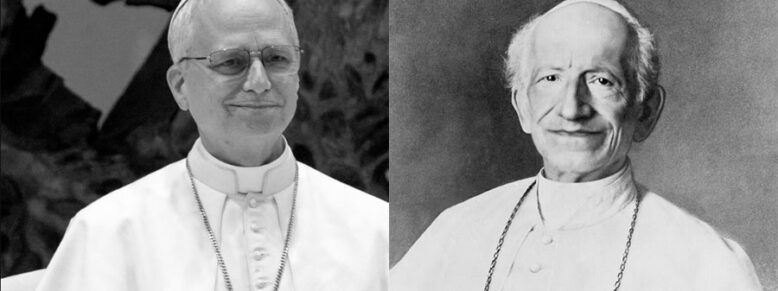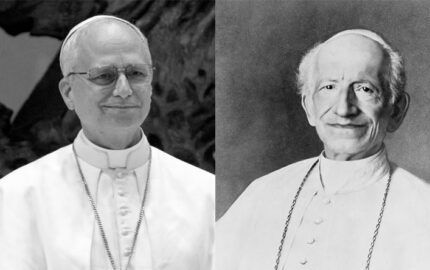After describing the context below, the three posts will take the themes of the document strictly in the order that they appear.
The encyclical begins by describing the situation in the world. Rerum novarum means “of new things” in Latin. The document begins with the words: “That the spirit of revolutionary change, which has long been disturbing the nations of the world, should have passed beyond the sphere of politics and made its includence felt in the cognate sphere of practical economics is not surprising”. He quickly moves on to list a whole set of social relationships which were changing.
Arguably, Rerum novarum came about 140 years after the beginning of the events that inspired (or necessitated) it: the Church took time to reflect. Those events were (inter alia):
1760 – the beginning of the industrial revolution and urbanisation
1776 – US independence, and the publication of “The Wealth of Nations” by Adam Smith
1789 – the French Revolution
1824 – the first commercial railway
1848 – revolutions across Europe (though not in Britain)
1867 – the publication of “Das Kapital” by Karl Marx
1870 – Italian unification
Many of the changes above were related to the introduction of radically secularist ideas into the political domain.
There was an intellectual upheaval greater than any since the Reformation which would include widespread discussion about a range of ideas concerning political and economic organisation. These ideas included: total economic laissez-faire; utilitarianism; Scottish enlightenment liberalism; socialism; Marxism; secular republican nationalism; constructivist-atheist-rationalism (for example, French Revolutionary ideas). Many of these ideas proposed, in effect, an alternative state religion of secularism which posed an existential threat to the institutions of the Church and the promotion of the common good. There was a real fear, for example, that anti-Christian republicans, socialists, nationalists and Marxists (and these are different groups of people) would try to stamp out the Church. At the same time, there was a real fear that certain liberal or laissez-faire ways of thinking would destroy the dignity of the worker or remove Christian moral reasoning from the economic sphere.
Overall, Rerum novarum navigated the choppy waters of socialism and certain forms of value-free liberalism. It provided a modern alternative to, and a strong rebuttal of, radical secularism that was attacking the Church, often with the aim of replacing her with unrestrained political power.
The right to property
In the remainder of these posts, we will look at the specific issues discussed in Rerum novarum. But it must never be forgotten that there was one over-arching theme: the salvation of souls and the development of institutions, policies and the economic, social and political relationships conducive to that end.
Pope Leo begins by setting the scene, recognising the poor material condition of the working classes and the exploitation by richer classes. He notes the need to ensure the just protection of the poor, including by public institutions. However, he quickly states that socialism is no solution. He describes how “crafty agitators” are perverting men’s judgements to stir up revolt: these crafty agitators were socialists and communists who had been criticised in no uncertain terms in earlier papal writing.
Indeed, the first remedy proposed in Rerum novarum is a very strong defence of private property. It is argued that the socialisation of property would be to the detriment of the working man, distorting the functions of the state and creating utter confusion. Rerum novarum contained a trenchant defence of the right to property and the institution of private property. The political context of the desire by socialists and secularists to destroy the Church, take the property of the Church and take the property of all individuals is important. However, it would be entirely inappropriate to dismiss Rerum novarum’s defence of private property by suggesting that it was contingent on these conditions. It is a central part of the document’s teaching and uses language that is clearly not context specific. Also essential, according to Rerum novarum, is the development of a polity in which many have the opportunity to hold property.
The argument for private property is tied to the status of a workman’s wages (5). A family’s savings, it is stated, are accumulated from wages and are therefore wages in another form. Given that Christians regard the taking of a person’s justly acquired earnings as a sin worse than theft, this has implications for how we view property. We are told that every person, by nature, has the right to hold property (6). This is part of our human nature because, in contrast to animals, man can reason and can therefore possess things not just for momentary use, but also to provide for the future.
It is then clearly stated that the right to private property does not contradict the principle of the universal destination of goods. Firstly, private property is a way of distributing responsibility for the goods of the world. Secondly, even if we are not owners, we benefit from what property produces. Private property is described as having, down the ages, been found to be pre-eminently in conformity with human nature and necessary for peace and tranquillity (11). Pope Leo then quotes divine law in relation to not coveting the property of another.
The tranquillity of a social order, which is an important justification for private property (a point also made by St. Thomas Aquinas), is then contrasted with socialism based on the community of goods which, Pope Leo states, would lead to “envy, mutual invective and to discord – the source of wealth would run down and that ideal of equality would involve a levelling down of all to a condition of misery and degradation.” (15) The encyclical continues: “Hence, it is clear that the main tenet of socialism, the community of goods, must be utterly rejected, since it only injures those whom it would seem meant to benefit, is directly contrary to the natural rights of mankind, and would introduce confusion and disorder into the commonweal.” It was then stated that the right to property is “inviolable”.
It is also important to note that the Catholic Church is very clear that, whilst the right to private property is conducive to a well-ordered, peaceful and prosperous society, this teaching sits alongside an obligation to use property for good purposes, including the support of the needy. In the modern world, we have come to assume that the state is the vehicle for the redistribution of property. In Christian thought through the ages, a strong moral responsibility is put on those who have material goods to help those who do not with substantial benefactions, a point developed later in the encyclical. If we do not live out that moral responsibility, we will have to answer to God.
This first blog post on Rerum novarum has only taken us through about a quarter of the encyclical. There is much to come on the family, the provision of welfare and the treatment of labour – once again, the teaching is placed in a very strong Christian context. These topics, and the rest of the encyclical, will be covered in the second and third posts.
—







